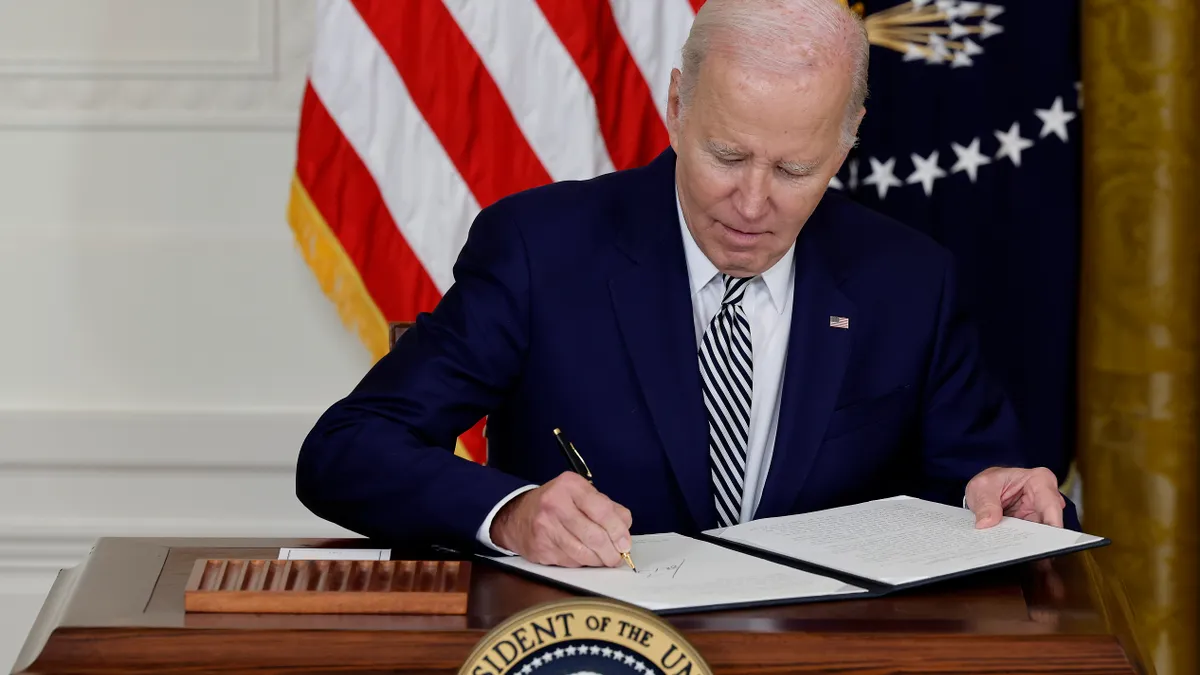Dive Brief:
- President Joe Biden on Wednesday signed a bill into law that will require the U.S. Department of Education to make the Free Application for Federal Student Aid available by Oct. 1 each year.
- The FAFSA released next year will be the first form to face the deadline mandated by the FAFSA Deadline Act.
- Calls for the department to formalize its traditional Oct. 1 publication date arose after the Education Department released the last cycle’s FAFSA almost three months later than usual, causing sectorwide delays and overall confusion.
Dive Insight:
Previously, federal law mandated that the Education Department release the FAFSA by Jan. 1 each year, although it urged the agency to publish on or as close to Oct. 1 “to the maximum extent practicable."
In 2020, Congress ordered the Education Department to simplify the famously complicated form. But the Education Department’s late rollout of the revamped FAFSA last cycle was plagued with last-minute delays and technical glitches for both students and colleges. The abbreviated timeline and confusion forced some colleges to push back their commitment deadlines from the traditional May 1 date.
To avoid similar issues this aid cycle, the department conducted several rounds of beta testing for the 2025-26 form before releasing it to the public. The FAFSA officially launched Nov. 21.
The new law requires the U.S. education secretary to certify to Congress by September if the agency will meet the Oct. 1 deadline. If the department anticipates missing that date, the education secretary would have to testify before Congress by Sept. 30.
In a call with reporters Thursday, Under Secretary of Education James Kvaal said the agency has “laid the foundation for next year's FAFSA” and provided a plan for the form to launch Oct. 1, 2025.
In a rare show of bipartisan cooperation, the FAFSA Deadline Act sailed through both chambers of Congress — every member of the House ultimately supported the bill in November, and the Senate passed it by unanimous consent less than a week later.
Rep. Erin Houchin, the Indiana Republican who introduced the bill, said at the time that the change would reduce confusion for families preparing for college by providing consistent FAFSA rollouts.
“The FAFSA Deadline Act will bring clarity to a system that too often leaves families in the dark," she said in a statement.
Rep. Bobby Scott, a Democrat from Virginia and ranking member of the House’s education committee, praised the bill's passage Wednesday.
“By setting the firm FAFSA release date, the FAFSA Deadline Act gives students and families more time to complete their applications and secure the financial support they need to attend college without unnecessary delays,” he said in a statement.
Several higher education groups, including the National Association of Student Financial Aid Administrators, supported the legislation.
"By codifying the October 1 release date for future FAFSA cycles into statute, colleges and universities will be able to provide financial aid information to students much sooner,” Nalia Medina, the organization's assistant director of government relations, said in a statement Thursday. She added that the change will give students more time to make informed education decisions moving forward.














